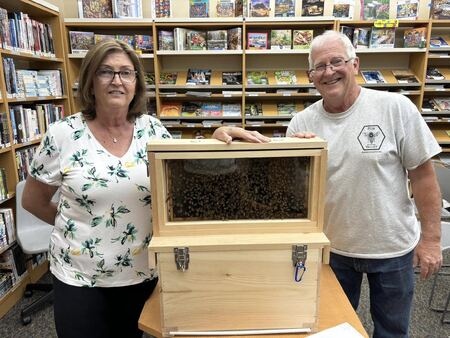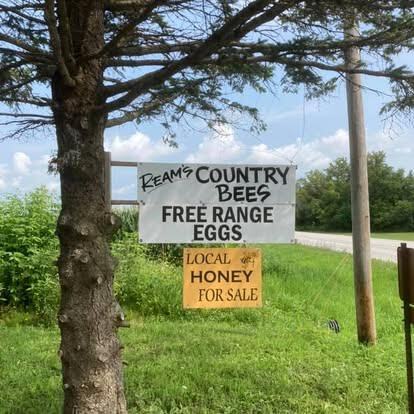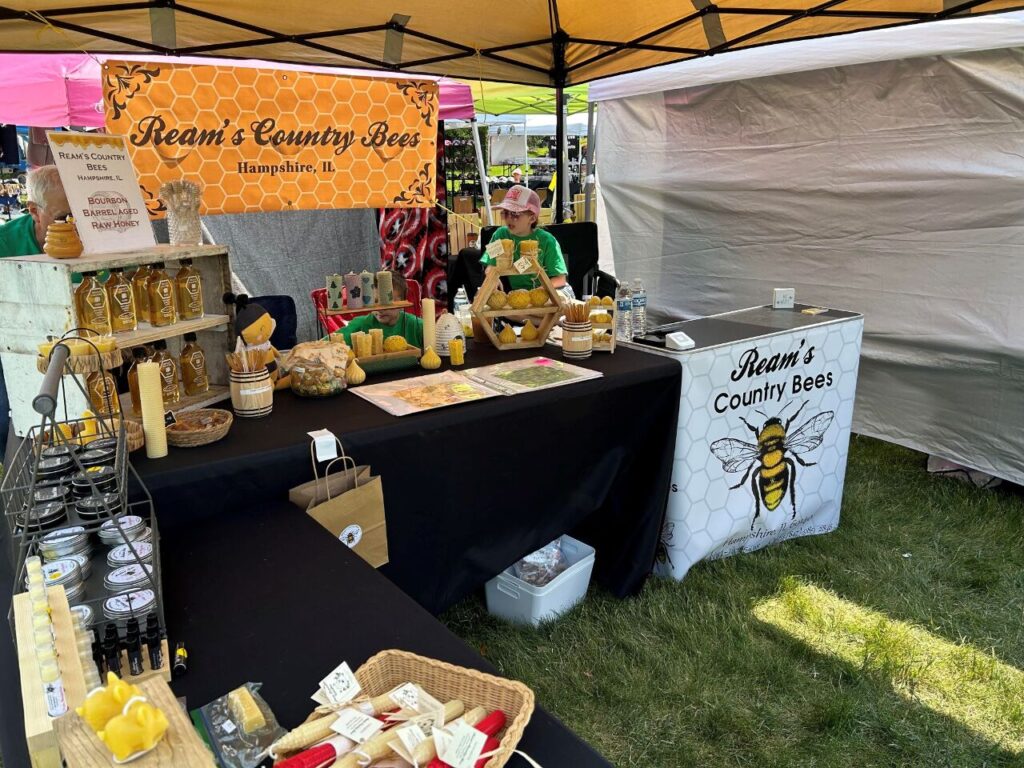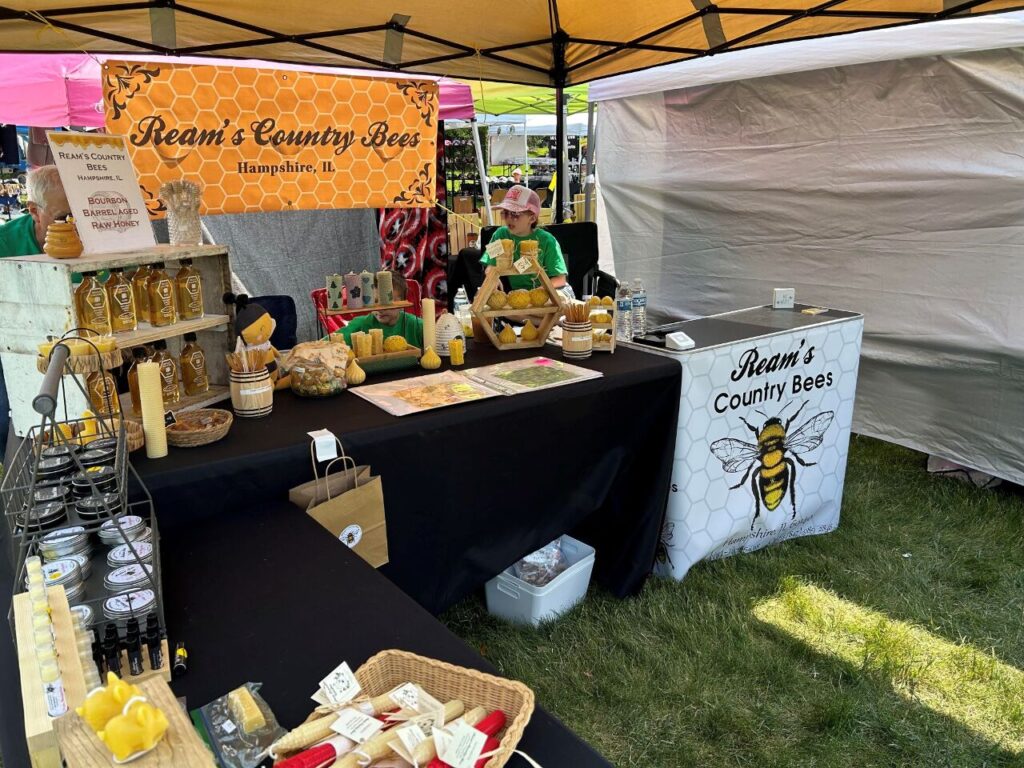The Growing for Kane series was created by Sustainable Agriculture Consultant Ellen Kamps 7/18/2025 11:00AM
Kane County Connects is spotlighting local farms that received grants through Kane County’s 2024 Food and Farm Resiliency Program. Funded by the federal American Rescue Plan, the program supports farmers as they continue to recover from pandemic-related challenges and work to strengthen the region’s food system.
Meet the Beekeepers

Tucked away on a quiet stretch of French Road in Hampshire, in Kane County, Mike and Pat Ream are the dedicated team behind Ream’s Country Bees. Since 2011, this husband-and-wife duo have been raising honey bees with care and intention, turning their backyard into a hub of pollination, production, and purpose.
What began as an effort to raise bees and produce quality honey, quickly blossomed into a growing business centered on sustainability and community. For years, Mike studied apiculture, the study of beekeeping. A decade later, the Reams have expanded their offerings from raw honey to a wide range of handmade goods; committed to only using the derivatives of their personal hives.
Besides honey, these beekeepers work with their bees’ natural byproducts including bee pollen, propolis, and beeswax.
“Everything the bees supply to us, we use for our products,” noted Mike. “In addition to raw honey, we transform these materials into skin care, candles, salves, lip and beard balms, beeswax food wraps, and our newest product: bourbon barrel-aged honey.”
The Magic of Honey
Since the dawn of mankind, honey has been revered across the globe. And it’s no wonder, honey is a byproduct of symbiotic magic: Many flowering plants require pollination to grow fruit, and attract pollinators with sugary nectar and nutrient-rich pollen; necessary to feed bee offspring. According to the University of Illinois’ BeeSpotter.org, honey bees travel up to two miles from their hive, and can spend up to 3 hours foraging before returning.
While visiting flowers, the fuzzy honey bee collects pollen, but inadvertently participates in pollination. Pollination occurs when the honey bee transfers the pollen from the stamen (male part) to the stigma (female part) within the same species of plant.

Nectar, the main ingredient in honey, is sought and brought back to the colony exclusively by female bees. Through an assembly line of duties, the bees pack the nectar into the hexagonal honeycomb, dry it with their wings, and tightly seal it off with beeswax.
“Honey bees will chew through the beeswax to access their honey reserves when it is time to eat,” Mike explained. “We do our best to help our hives overwinter in Kane County, and this means giving them at least 100 pounds of honey during the winter months.”
Honey is produced using the nectar of flowering plants, and while it contains mostly sugar, it also includes a mix of amino acids, vitamins, minerals, iron, zinc and antioxidants. The National Honey Board notes that there are more than 300 types of honey available, depending on flowers that the bees visit.
Buzzing for Kane County
Ream’s Country Bees, like other bee keepers in Kane County, specialize in raising Apis mellifera, the scientific name for the honey bee. This social species is native to Europe, the Middle East, and Africa, but is usually referred to as the European honey bee as it was introduced by colonies in the 1600s.
While there have been reports of bee-colony-collapse as close as Rockford, Ream’s Country Bees is off to a highly productive start for the 2025 season.
One of the services that Ream’s County Bees provides is free pollination services for food farmers, including apple orchards at Bean’s Farm Landscape Supply and produce fields at Stojan’s Family Farm.
“It’s mutually beneficial for our business, the bees, and our local food economy,” Mike explained. “We offer this service to small Kane County farms free of charge.”
The Ream’s also respond to calls reporting wild honey bee swarms, and depending on the location, they can sometimes intervene and collect the bees.

“While honey bee swarms can look intimidating, they are often docile groups of bees who have split from the original hive, and are looking for a new home,” Mike said. “This usually happens in the spring, when a large population has run out of space to store their honey and offspring.”
Ream’s Country Bees specializes in healthy Kane County hives, but their operation is the fruit of lifelong learning.
“Every season we learn something new,” explained Mike. “But if folks stop by our booth or give us a call, we’re happy to talk shop about harvesting, overwintering, ventilation, or hive locations. We want to share what we’ve learned with the next generation of Kane County beekeepers.”
What’s New for 2025
When asked how the Food & Farm Resiliency Grant has changed their operation, Ream’s Country Bees explained that they have been able to expand their hives and upgrade their extracting equipment.
“For 2025, we purchased 12 new colonies, new jars and labels, a motorized honey extractor, and a professional uncapping tank,” explained Pat. “This will allow us to process honey quicker, while maintaining the highest standards of sanitation. These efficiencies will help us pollinate more crops, and meet more community members at market.”
With good planning and organization, Ream’s Country Bee’s accredited their increased capacity to the Food & Farm Resiliency Grant.
“Our capacity has increased tenfold in the past six months,” explained Pat. “More people and farms in Kane County know our name.”
Where to Find Ream’s Country Bees
Customers can purchase Ream’s Country Bees products directly from their farm at: 14N400 French Rd., Hampshire, IL 60140. It is best to contact them in advance for product availability via their Facebook page, by calling 847-989-2838, or emailing at mbream@sbcglobal.net.
They also sell at the following Hampshire locations:
- Blocks Fresh Market – 199 Maple, Hampshire, IL 60140
- Prairie View Garden Center – 48W130 IL-72, Hampshire, IL 60140
- Kave Bar – 123 Washington Ave, Hampshire Il, 60140
- Bean’s Farm Landscape Supply – 46w640 Big Timber Rd, Hampshire, IL 60140
The Growing for Kane series was created by Sustainable Agriculture Consultant Ellen Kamps.








